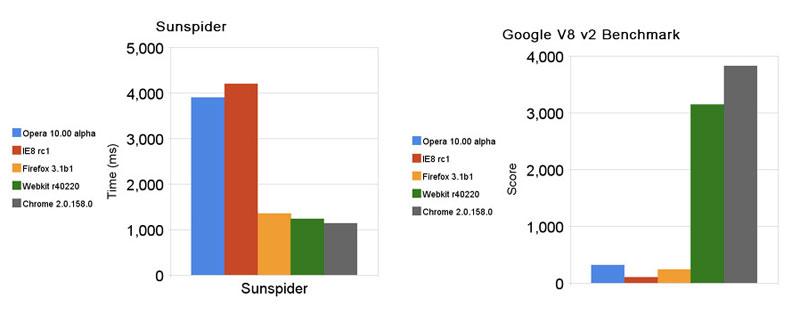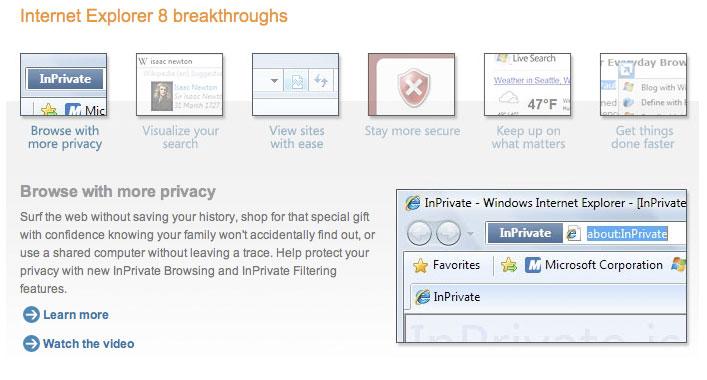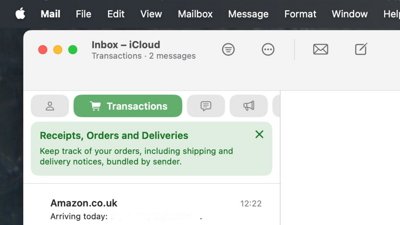Microsoft's overnight posting of the final Internet Explorer 8 pre-release build prompted ZDNet Australia to run it through some benchmark tests against its counterparts.
On the Sunspider JavaScript performance test, despite all the performance improvements Microsoft says it's making, IE8 finished last by roughly 3,000ms. Â It was narrowly bested by Opera 10 alpha, while bunched at the top of the performance ranks and separated by slight margins were Google Chrome 2.0.158.0, WebKit r40220, and Firefox 3.1 beta 1. Â WebKit serves as the foundation of Apple's Safari browser.
ZDNet was not surprised to find that Google's browser came in first on Google's own V8 JavaScript Benchmark, while WebKit finished a close second. Â Opera and Firefox trailed well behind in third and fourth, while Internet Explorer was a distant last.
Sunspider test results (shorter bars are better) and Google V8 v2 test results (longer bars are better).
Although its appearance is mostly unchanged from IE7, IE8 has received some new features, including a private browsing mode Microsoft calls InPrivate, joining long-present similar features in Safari, Opera, and Chrome.
The new Internet Explorer also has automatic crash recovery, domain highlighting for spotting phishers, and a safety filter. Â New plug-ins called Accelerators are designed to speed access to information. Â Users can choose from about 80 currently available for download, while pre-installed Accelerators include Windows Live functions like blogging, e-mail, mapping, and translating.
The browser, according to Microsoft, is virtually feature-complete, and users should expect little change between the release candidate and the upcoming final version.
"The ecosystem should expect the final candidate to behave like the release candidate," said IE General Manager Dean Hachamovitch.
IE8 is compatible with Windows XP SP2 and Vista, but not the Windows 7 beta. Â Microsoft says it will build a version of IE8 into the final release of Windows 7 with "unique features and functionality" exclusive to the company's new operating system that will eventually succeed Vista.
 Zach Spear
Zach Spear








-m.jpg)






 Malcolm Owen
Malcolm Owen

 Amber Neely
Amber Neely

 Wesley Hilliard
Wesley Hilliard


 William Gallagher
William Gallagher









50 Comments
You can expect more marketshare loss from IE in the coming years. Firefox, Safari, and Chrome are just more appealing.
I don't think Microsoft can get anything right these days. They just failing in almost everything. How is that GOOGLE is far advanced than Microsoft. That's just so ironic.
<quote>IE8 is compatible with Windows XP SP2 and Vista, but not the Windows 7 beta. Microsoft says it will build a version of IE8 into the final release of Windows 7 with "unique features and functionality" exclusive to the company's new operating system that will eventually succeed Vista.</quote>
Didn't MS already get in trouble for things like this with IE 5 and monopolistic things with the SEC? And embedding Windows 7 OS only features with the browser? Perhaps I'm wrong, but something screams ill about this.
No IE for OS X or Linux (not that I'm sad about that fact). I wish they would give up on IE, and let Firefox/Chrome take over on their platform. Separating the Browser from the OS from a security point of view is much safer anyways.
I'd also like to see Apple drop Safari (or sell it to someone else) and focus only on their OS and creativity software to make them more stable and release a little faster.
I'd also like to see Apple drop Safari (or sell it to someone else) and focus only on their OS and creativity software to make them more stable and release a little faster.
That would be an awfully short sighted move.
You can expect more marketshare loss from IE in the coming years. Firefox, Safari, and Chrome are just more appealing.
We'll see. I suspect that Windows 7 will give IE8 a huge boost. Everyone is going to have to either re-download and/or re-install Firefox, while IE8 will just be there and probably be "good enough" for most.
Microsoft is the master of the "get good-enough in people's faces" strategy.